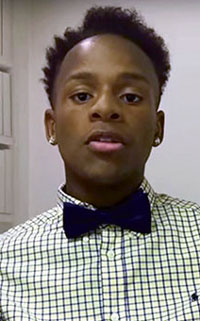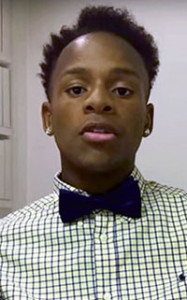
 AAHU Fellow Charles Pettiford: Even if there is a cure, I will Remain in this field
AAHU Fellow Charles Pettiford: Even if there is a cure, I will Remain in this field
Charles J. Pettiford, Prevention Coordinator, Meharry Medical College, Nashville, Tenn.
One in a series about recent graduates of the African American HIV University (AAHU)
You’re only 25, but you already have a lot of experience in the HIV/AIDS field. Can you talk a little about your work?
Currently, I am the prevention coordinator at Meharry Medical College in Nashville, Tenn., where I make sure people stay linked to care.
I am also responsible for organizing HIV prevention and education events at the school. I am also a Greater Than AIDS ambassador for the national-led social media organization, where we used different social media platforms to break the silence of HIV and AIDS. Prior to my work at GTA and Meharry, I worked at Street Works, a non-profit organization that provides free, confidential HIV testing and supportive services to persons living with HIV disease in Nashville, and does a lot of HIV outreach and education in the community.
What made you decide to work in HIV/AIDS?
I found out that I was HIV positive in August of 2014, and that’s when I decided to start working in the field.
Why did you apply to the AAHU program?
I heard about the AAHU training from a fellow AAHU student who posted it on the Greater Than AIDS website. After reading the criteria and what the training offered, I decided to apply. When it came to the education, the language and the learning about the medication and prevention of HIV, the training was more intense than I thought it would be. But it really helped me understand what HIV does to the body.
So you didn’t know a lot about the disease prior to doing the training?
The crazy thing is, as an HIV-positive man, no, I didn’t. I only knew what the HIV acronym stood for and how you contracted it. But in terms of the life cycle of the disease, the statistics and the side effects of the medication, I didn’t know much about those things. The AAHU program was very educational and one of the best experiences that I had. It was helpful to learn so much about the disease for myself, and also so I could bring that information back to my community in Nashville.
Since completing AAHU, how has your life changed?
The training changed my entire outlook toward the disease. Before going into the program, I was struggling with myself and trying to cope with HIV. Now I know how to read charts and understand my viral load and CD4 count. I also know the language that I should be using during my doctor visits, as well as the language the doc-tors should be using.
Why is the AAHU program so important for the Black community?
People tend not to talk about the disease in my community. They still feel like it’s just a gay man’s disease. But I’ve been trying to get people to understand that HIV doesn’t have a face or a name. I tell people HIV lives within us, but we don’t live within HIV.
Where do you see your-self in five years? Do you want to stay in the HIV field?
Yes, I see myself continuing to fight against HIV/AIDS. Even if there is miraculously a cure, I’m still going to try to stay involved, not just being part of the field, but also making sure that people remind them-selves they still need to be treated. There are other STDs out there as well, so I want to stay in the health field to provide people with education and to tell them that they have to have safe sex. Things happen, and you need to know how to live a healthy life.
LaShieka Hunter is a freelance writer and editor based on Long Island, N.Y.


Be the first to comment